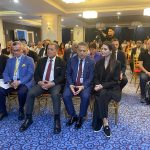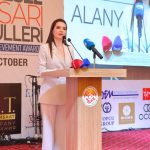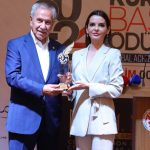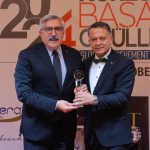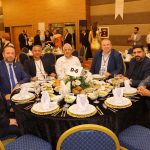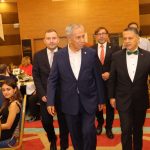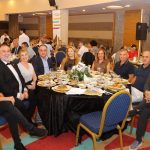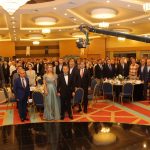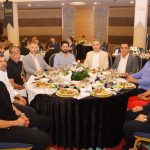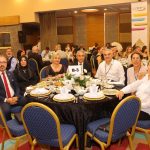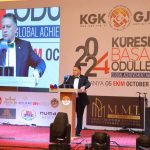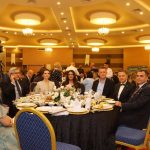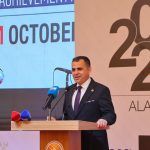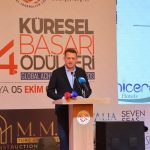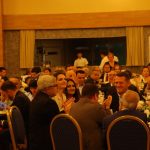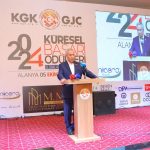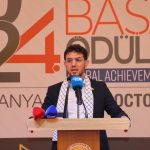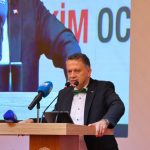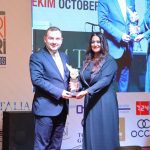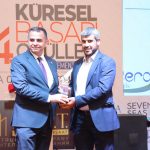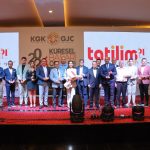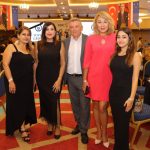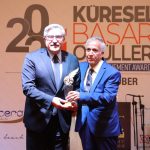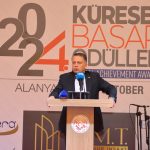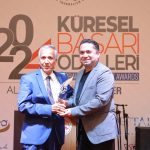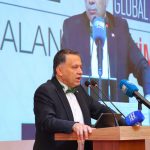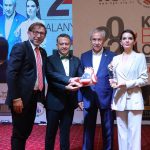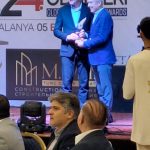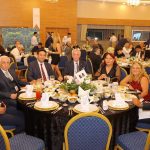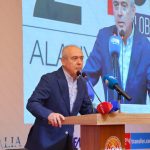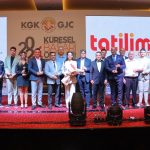GJC 4th Alanya Media Gathering successfully completed
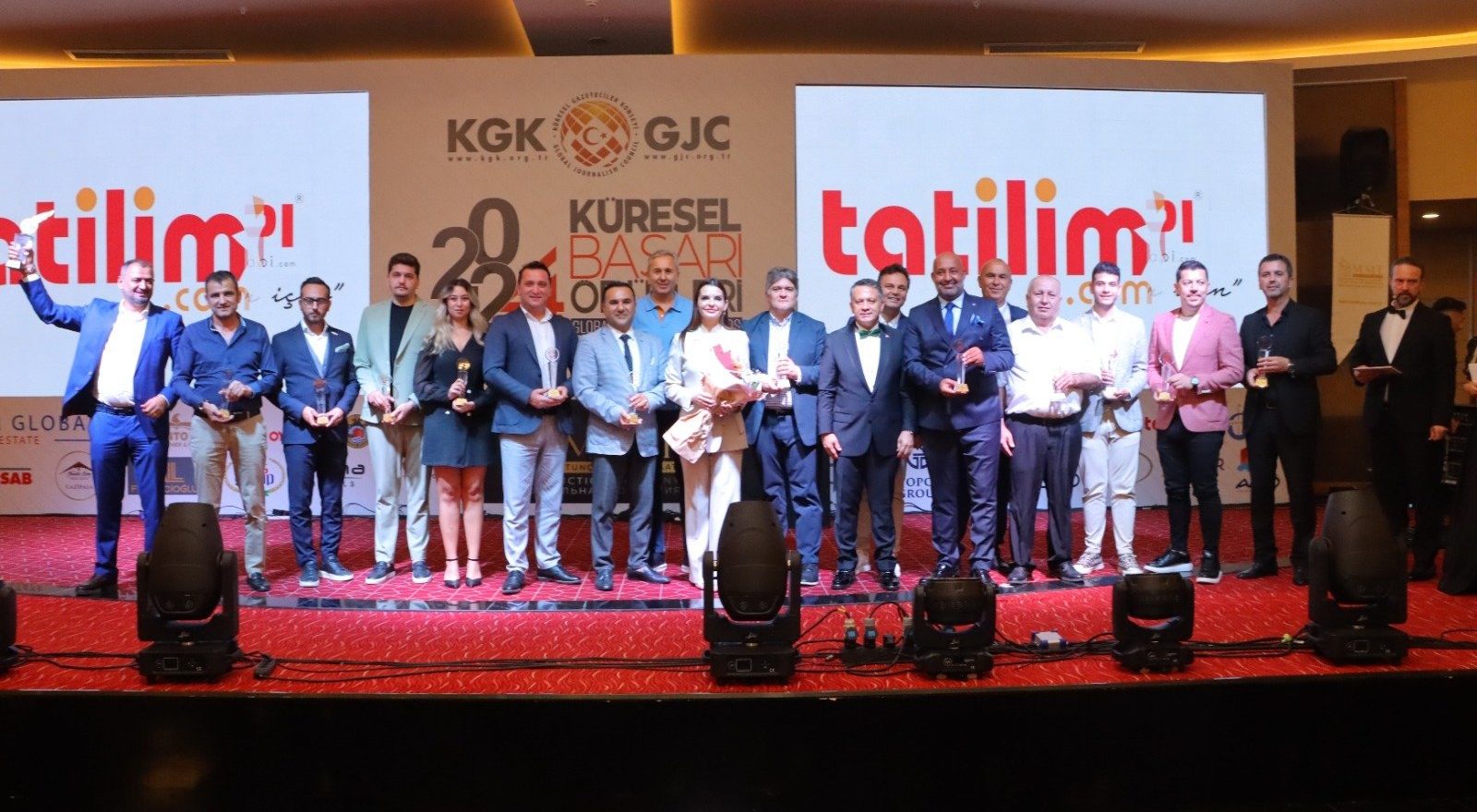
The fourth of the Global Journalism Council (GJC) global media gatherings took place in Alanya between October 3-6, 2024.
In the touristic city of Alanya, located on the Mediterranean coast of Turkey, 150 journalists from 30 countries and Turkey participated in the meeting, GJC elected boards held their meetings. Later, the meeting ended with a digital media workshop and the Global Achievement Awards Ceremony in the evening.
The guest of honor of the meeting was Gagauzia President Evghenia Gutul.
WORKSHOP
In the workshop, which started with the ordinary meetings of the GJC Board of Directors, the Board of Presidents, and the councils of the mainstream, local and foreign media, as well as a general meeting in the conference halls of the Eftelia Marin Hotel, presentations were made on various topics as well as professional problems and solutions. Local and foreign journalists also discussed opportunities for sectoral and social cooperation and solidarity.
Professional development and the future of journalism were discussed.
DIGITAL MEDIA PANEL
Later, the Global Journalism Council (GJC) Digital Media Workshop, moderated by Assoc. Prof. Dr. Hüseyin Yayman, emphasized the importance of adaptation to the age of digitalization and artificial intelligence.
Assoc. Prof. Dr. Hüseyin Yayman, Chairman of the Digital Media Commission of the Grand National Assembly of Turkey, gave information about the legal regulations and legal developments regarding today’s social media channels, especially Google, and said: “Digitalization is now a fact of life. Not only newspapers, but also the economy, art, in short, the whole life has been digitalized. However, we associate digitalization with degeneration, cyber fascism, abuse, and all kinds of negativity we can think of. We need to change this immediately. My last sentence on digitalization is that transnational digital networks see themselves above the legislature, the executive, the judiciary, the nation state. This poses a very serious threat. Youtube has 60 million followers, Instagram has 60 million, Facebook has 35 million, Tiktok has 30 million, X has 20 million. We must protect the family, children, women and public order.”
The other 4 panelists spoke as follows:
Communication Expert Prof. Dr. Zakir Avşar: “We have made a rapid transition from traditional media to digital media. Naturally, we are experiencing the pains of this. Professions create their own ethical rules over time. It is the ethical rules that make professions a profession. A profession without ethical rules is not a profession. Professions should be able to audit themselves. Professional organizations should do this themselves. Then we will never discuss the concept of censorship. When we get caught up in the lust of speed and want to report the news before everyone else, the truth disappears. This is the biggest problem. We journalists have always prioritized the truth, we have paid the price for this, and we are still paying the price. What makes journalism a great profession is the struggle for truth. If this struggle is not continued, there is no journalism. The concepts of clicks and interaction are killing our profession. We didn’t do traditional journalism for ratings and circulation. When we did our job right, these things came by themselves. This is our main problem now. We should not leave the supervision to the administration. The administration’s supervision is not always accurate. I propose joint supervision. The job here falls to journalists, who should not leave supervision to the administration. If journalists do not do this, external interventions will become more frequent. We must not rot within ourselves and we must protect our profession. If we pay attention to ethical codes, no one will need to police us. There is almost no difference between ethical codes around the world. So there is one way of thinking. When we follow these codes, the problem ends.”
Zafer Küçükşabanoğlu, President of the Artificial Intelligence Policy Association: “In this period when technology has developed so much and artificial intelligence is being talked about, there is a group of people who feel fear and anxiety. On the opposite side, ‘The world is changing a page. Technology is now at the center of this page’ and there is a group of people who are excited and curious. There is no point in fear and anxiety. We need to be excited and curious and utilize the opportunities of technology. The world has entered a transformation, change and transformation. The world is turning a brand new page. We are right in the middle of this transition period. We have always been late in industrial revolutions. The driving force is now artificial intelligence, and if we are late this time, we will be out of the game. Artificial intelligence is not a utopia, it is not the technology of the future but of today. So will artificial intelligence take away journalists’ jobs? Artificial intelligence can speed up journalists’ routine news production processes, data analysis and content results. It facilitates automatic writing. But the aspects of journalism that rely on human skills such as research, analysis, ethics and decision-making currently challenge AI. It is said that AI cannot do these complex jobs right now. However, if we do not improve ourselves, this situation may be different in 10 years.
For example, we can save time and spend our time more efficiently with artificial intelligence, such as transcribing an interview. In short, if we don’t use AI, we will fall far behind the game. The age of artificial intelligence has begun. 85 million people in Turkey need to be interested in artificial intelligence. This is no longer a magazine topic. All of Turkey should be interested and integrate artificial intelligence with their professions. Yet 5 percent of our society can define artificial intelligence. Therefore, we must teach artificial intelligence to the society. Artificial intelligence technology is improving itself moment by moment.”
İsmail Bayazıt, GJC Vice President and communication expert: “Big data is not known very much. Imagine a huge digital library. There are 2 trillion data entries every day. The security and quality of the data is important. Social media users in the Turkish world share the most security, defense, education, sports and health topics respectively. The most used social media is still Facebook, but TikTok is rising rapidly.”
GJC Advisory Board Chairman Prof. Dr. Levent Eraslan: “Digital journalism and news sites do not work the way we want. They have separate problems and economics. We need to address this. The difference between traditional journalism and digital journalism is that digital focuses on clicks. Traditional journalism emphasizes research and verification. In the future, we will see the cooperation of traditional and digital media, which we call hybrid media. Social media also has legal responsibilities, the parliament is working on this issue. There is a serious lobby. There are social media wars. Digital networks do not comply with control mechanisms. They comply with the rules in Europe and America, but not in Turkey. This is not a restriction of freedom. The Republic of Turkey is not a banana republic. You will follow the rules. Disinformation and censorship laws exist all over the world. If you see the German law, it would be devastating. They have very harsh penalties. Embrace digitalization, there is no escape from it. The way people produce and consume news is changing. Work with professionals. Create verification mechanisms. Pay attention to interaction and feedback. Use multiple platforms.”
GUTUL: WE WANT PEACE
Gagauzia President Evghenia Gutul, who attended the last part of the GJC Media Workshop and answered the questions of journalists, stated that they expect support from the world public opinion for the solution of the problems experienced by her country, which has autonomy under Moldova.
Stating that she was very happy to be in Turkey and Alanya, Gutul thanked GJC President Mehmet Ali Dim and GJC management for their invitation. Gutul gave information about Gagauzia and said that they are seen as enemies in Moldova and that they have problems, but they want good dialog and peace with Moldova and all countries of the world. Stating that they always feel the support of brotherly Turkey, Gutul said that he has met with Russian President Putin several times and that they are waiting for an appointment to meet with Turkish President Recep Tayyip Erdoğan.
Gutul also said, “We are celebrating our 30th anniversary on December 23, 2024. We invite you all to this very important holiday. You will see that our culture and language are very close to each other in Gagauzia.”
GLOBAL ACHIEVEMENT AWARDS CEREMONY
The traditional Global Achievement Awards Ceremony of the Global Journalism Council (GJC) was held at Lonicera World Hotel with an intense participation. President of Gagauzia Evghenia Gutul received the ‘Global Diplomacy Award’ at the spectacular ceremony. Princess Skha and former Speaker of the Turkish Parliament Bülent Arınç were also guests of honor. Palestinian journalists who received the journalism award were overwhelmed with emotion. The Global Success Awards Ceremony took place in the ballroom of Lonicera World Hotel. The award ceremony was broadcast live by more than 20 TV channels from 3 different countries including Gagauzia TV. Global Journalism Council (GJC) President Mehmet Ali Dim said, “It is a very nice ambiance, a very nice community. It is really an honor to address this community. We would like to thank everyone who did not leave us alone on this special day.” Global Diplomacy Award to Gagauzia President Evghenia Gutul, Global Journalism Award to Palestinian journalist Dr. Zahir Elbek, Global Media Award to Palestinian Al-Aksa TV General Manager Sulaiman S. H. Abuseta, Global Innovation Award to Zafer Küçükşabanoğlu, President of the Artificial Intelligence Association, Global Sports Award to Emin Müftüoğlu, President of the Turkish Cycling Federation, Professional Honor Award to Yavuz Donat, a veteran Turkish journalist and writer, and
Hüseyin Yayman, MP and Chairman of the Digital Media Commission of the Grand National Assembly of Turkey, received the Turkish World Award. The award ceremony ended with a gala dinner and musical entertainment.

